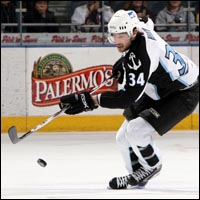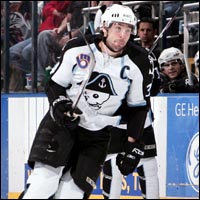by Charlie Larson || AHL On The Beat Archive
 Hockey coaches love statistics. They want to know which player has the fastest slapshot, who scores the most goals, and what the team’s record is when they play within their own division, on the road, on Saturday nights. In January.
Hockey coaches love statistics. They want to know which player has the fastest slapshot, who scores the most goals, and what the team’s record is when they play within their own division, on the road, on Saturday nights. In January.
A cursory scan at the Milwaukee Admirals’ stats and Alex Henry’s name doesn’t exactly pop off the page. A hulking defenseman who stands 6-foot-5 and tips the scales at 220 pounds, the Admirals’ captain is having a career year offensively as his 12 points are tied for the best of his nine-year career. But that output ranks just 13th on the team 362nd in the AHL.
However, Henry’s importance to the Admirals goes beyond what you see in the boxscore and has more to do with an ability that you can’t quantify: leadership.
His credentials for wearing the “C” are certainly notable. A veteran of nine professional seasons, he has skated in over 300 contests for three AHL teams, and has played 175 games in the NHL with the Edmonton Oilers, Washington Capitals and Minnesota Wild. He was also selected as the Wild’s captain for the month of October during the 2003-04 season. (The Wild have a tradition where they change the team’s captain each month.)
A veritable elder statesman at 28 years old, Henry’s leadership is particularly important on a team that features 11 players who were entering their first full season in the league and had only seven players at the beginning of the year who played more than a few games for the Admirals in 2006-07.
Not what you would exactly be described as a vocal leader, for Henry things start with a work ethic that sets the tone on the ice. That means performing at the highest level for every practice and game, even on the days where you just might not feel at the top of your game.
“You have to be sharp all the time because I know that guys are looking at me. If I’m not having a good game or a good practice and not giving my best, I know that the other guys out there see me and say ‘I guess I don’t have to do my best either.’”
“He brings a level of professionalism that young guys on our team see and can feed of off and learn from,” said first-year Admirals head coach Lane Lambert. “What he does for us as coaches is certainly invaluable.”
In addition to an impressive work ethic Henry also displays a particularly high level of toughness as evidenced by his 111 penalty minutes. While not exactly known for his pugilistic tendencies, he is not afraid to drop the gloves if that is what it takes to keep the opponent honest or if the team is sluggish and in need of a wake-up call. However, he also recognizes that there is a time and place for it and he must be able to distinguish between the two.
“Fighting has always been a part of my game, but this year I have had to do it a little more,” noted Henry. “It definitely depends on the circumstances and this year the opportunities have been more prevalent for me to do so.”
 That toughness was also on display at the end of last season when he suffered a knee injury in the middle of March that could have easily ended his year. While a lesser player might have been reluctant to return for fear of re-injury, he endured a rigorous rehabilitation schedule and made it back to play in the team’s final two playoff contests.
That toughness was also on display at the end of last season when he suffered a knee injury in the middle of March that could have easily ended his year. While a lesser player might have been reluctant to return for fear of re-injury, he endured a rigorous rehabilitation schedule and made it back to play in the team’s final two playoff contests.
“I just tried to work as hard as I could and used every day as best as possible. Working with [team trainer] Doug Agnew and [team physician] Dr. Wickman I was able to make it back to play in those last two games.”
Another role for the captain is to facilitate communication, not just on the ice, but in the locker room and off the ice in general.
“The dressing room was a little bit quiet at the beginning of the year, and so I tried to do a little bit more talking than I have before. For [players] that haven’t been here before they might not be as comfortable at first, so it takes someone to get the ball rolling and once it is rolling it becomes easy.”
Admirals rookie Cody Franson has felt the effect of Henry’s leadership during his first professional season. A highly-touted blueliner in the Nashville organization, Franson has seen a steady improvement in his game over the course of the season and he attributes some of that success to Henry’s assistance.
“It’s different here than what it was like in juniors and a lot of the adjustment has to do with feeling more comfortable out on the ice and Hank really helped out with that, making sure I was in the right place at the right time,” said Franson.
Whereas many rookies hit the wall after about 50 games, Franson best play has come as of late. In February alone he notched five goals totaled 12 points, far and away his most productive month of the season.
Lambert certainly agrees with Franson’s sentiment. “If you look at Cody and the improvement that he has made in his development, it isn’t only a credit to Cody, himself, but also to watch and learning things from guys like Henry.”
Perhaps what says the most about Henry’s leadership and commitment are the similarities that Lambert draws between Henry and Lambert’s former Detroit Red Wings roommate — and one of the game’s great leaders — Steve Yzerman.
“From a leadership perspective, Yzerman was a quiet guy who led by example, both on and office the ice, and guys took notice of it. I think that Alex does things in the same way.”
Still, Henry remains humble about it all. “I respect the guys in the room and there are many players that I look up to, so any time you are part of a group like this and they choose you to lead them it is definitely an honor.”





































